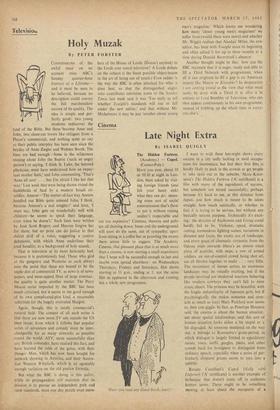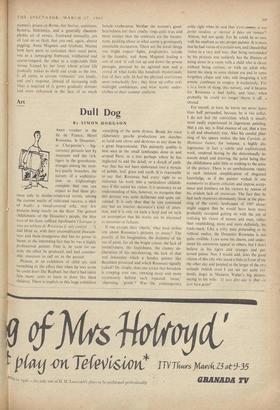Cinema
Late Night Extra
By ISABEL QUIC1.1'
The Hidden Fortress. (Academy.) — Caged. (Cameo-Poly.) HAVE you ever, about 10 or 10.30 at night in Lon- don, been asked by visit- ing foreign friends (and felt your heart sink) what they can do: mean- ing some sort of social entertainment that's (how to put it without raising smiles?) respectable and not too expensive? Cinemas, theatres and pubs are all shutting down; buses and the underground will soon do the same, out of sympathy; apart from sitting in a coffee bar or prowling the streets there seems little to suggest. The Academy Cinema, that pleasant place that is so much more than a cinema, is now starting a small experiment that I hope will be successful enough to last and maybe even spread elsewhere: on Wednesdays, Thursdays. Fridays and Saturdays, film shows starting at II p.m., ending at 1; not the same film as appeared in the afternoon and evening, but a whole new programme.
Ware you rend any Good Books lately:" I want to wish these late-night shows every success in a city sadly lacking in staid occupa- tions for insomniacs, but feel their first film is hardly likely to pack in the crowds or get people tc take taxis out to the suburbs. Akira Kuro- sawa's The Hidden Fortress ('A'•certificate) is a film with many of the ingredients of success.
but somehow not mixed successfully; perhaps because it's hard to see, at this distance from Japan,- just how much is meant to be taken straight, how much satirically, or whether in fact it is trying to be serious, but without any basically serious purpose. Technically it's excit- ing: the director of Rashomon and Living could hardly fail to be. Violence, speed, dramatic cutting. tremendous fighting scenes, variations in distance and focus, the exotic use of landscape, and every piece of cinematic virtuosity from the Odessa steps onwards (there's an almost exact piece of pastiche, with steps, a .row of armed soldiers, an out-of-control crowd being shot at), are all thrown together to make . . . very little.
The movement of horses across an enormous landscape may be visually exciting, but if the people involved are medkeval warriors behaving like modern cowboys they can't fail to raise ironic cheers. The princess may be beautiful, with the fragile unfamiliarity of Japanese girls, but if ps}chologically she makes nonsense and over- acts as much as (say) Mary Pickford now seems to, then you giggle. In fact, as Penelope Houston said, the cinema is about the human situatior., not about spatial relationships, and this sort of human situation' looks either a bit stupid or a bit degraded. As someone muttered on the way out, it belongs to Kurosawa's grunt-period, in which dialogue is largely limited to ejaculatory noises, roars, sniffs, gurgles, pants, and other sounds hard for foreigners to distinguish from ordinary speech, especially when a series of par- ticularly eloquent grunts seems to turn into a subtitle.
Renato Castellani's Caged (Nella eitta /'inferno) (`A' certificate) is another example of technique that doesn't come off in authentic human terms. There ought to be something moving at least about the occupants of a women's prison in Rome, but horror, sentiment, hysteria, histrionics, and a generally claustro- phobic air of sweaty, frustrated sensuality, are all laid on so thick that you end, again, almost giggling. Anna Magnani and Giulietta Masina both have parts to caricature their usual parts, one as a rampaging firebrand, wildhaired and coarse-tongued, the other as a respectable little mouse framed by her lover whom prison life gradually makes as shrill and crude as the rest. It all seems to scream 'virtuosity' too loudly, and one's response, instead of increasing with what is required of it, grows gradually dimmer and more exhausted in the face of so much female exuberance. Neither the women's good- heartedness nor their cruelty rings quite true, and more sinister than the criminals are the warder- nuns, padding about in what seems a grotesquely unsuitable occupation. There are the usual things you might expect--fights, pregnancies, suicide in the laundry, and Anna Magnani leading a sort of rock 'n' roll riot up and down the prison passages, pursued by an agitated nun and a crowd of what looks like hundreds mysteriously free of their cells. In fact the plisical restrictions seem remarkably few ; they brew up coffee over midnight confidences, and wear scanty under- clothes as their summer uniform.







































 Previous page
Previous page